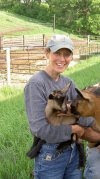 Dr. Tom Prieve, a veterinarian, and Dr. Sue Wika, a sociologist, are exemplary teachers, collaborators and farmers who respectively head the Equine Science and Sustainable Food Production programs at M State in Fergus Falls. They live on Paradox Farm where they raise performance Quarter horses, goats, chickens, turkeys, and geese.
Dr. Tom Prieve, a veterinarian, and Dr. Sue Wika, a sociologist, are exemplary teachers, collaborators and farmers who respectively head the Equine Science and Sustainable Food Production programs at M State in Fergus Falls. They live on Paradox Farm where they raise performance Quarter horses, goats, chickens, turkeys, and geese. Dr. Prieve and Dr. Wika work well as a team both on their farm and at M State. Dr. Prieve brings a background in science and holistic veterinary medicine (he provides chiropractic and acupuncture treatments at Lake Region Veterinary Center). Dr. Wika brings her own experience with livestock as well as expertise in community-building and education. They each teach courses in the Equine Science and Sustainable Food Production programs, balancing for students scientific, social, and cultural perspectives on animal husbandry, agriculture, and ecology.
Their primary goal for Paradox Farm is to steward the native oak savannah and establish more perennial crops. As a first step, they introduced dairy goats to help with brush clearing. A local market for goat products encouraged Wika and Prieve to expand their herd and breed meat goat genetics into their dairy stock.
More recently, Wika and Prieve started custom-grazing cattle and expanding their perennial crops by planting a wide variety of fruit and nut trees.
Leveraging their knowledge of agroforestry and grass-based permaculture, Wika and Prieve are growing an edible forest to yield heirloom apples, cherries, apricots, plums, pears, Korean pine nuts, hazelnuts and other high-quality human foods. The tree crops also offer the potential for biofuel production and provide energy-dense animal feed, which could support pastured pigs and sheep in the future.
Dr. Wika started the Sustainable Food Production at M State to address “the social part of regenerative agriculture” – kindling excitement about farming and strengthening people's connection to nature.
Wika and Prieve emphasize both in the classroom and on the farm that observation and adaptability are key to sustainability and success. “We want to observe what the land is telling us, what the animals are telling us, and have that inform our planning.”
No comments:
Post a Comment